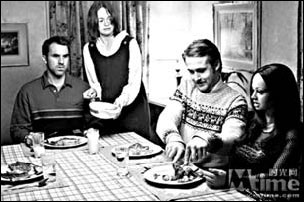Reviews
TV
The No 1 Ladies' Detective Agency

Directed by Anthony Minghella, starring Jill Scott, Lucian Msamati, Anika Noni Rose
I really wanted to like The No 1 Ladies' Detective Agency (BBC TV, March 23), it being, as it turned out, Anthony Minghella's final throw of the dice. But I failed miserably, as I once did with the book. I found Alexander McCall Smith's novel - the first in an astonishingly successful series - twee, quaint, shallow, possibly patronizing. And these qualities have now been successfully transferred to the screen.
It's a bland, saccharine drama, filmed in Botswana, a beautiful African country where smiley happy people, cardboard cut-out characters, go about their business with good humor, hard work, morality and diligence. There are a few baddies, but they're not that bad, and Precious Ramotswe (what were you thinking, Jill Scott?) sees them off. And Botswana goes back to being a place that could have come straight out of a promotional film by its tourist board.
Everyone will love it, of course, especially the Americans, I imagine. There will probably be awards, too. But it has no passion, no depth, no edge, no nothing. And it's such a pity, when there aren't enough black people on British television, that so many should end up in this saccharine gloop. Sorry, enough said.
The Guardian
Film
Lars and the Real Girl

Directed by Craig Gillespie; starring Ryan Gosling, Emily Mortimer, Paul Schneider, Patricia Clarkson
This is the second movie by talented British director Craig Gillespie, working from an Oscar-nominated original screenplay by Nancy Oliver, one of the writers on TV series Six Feet Under.
The film is set in winter in an unnamed small town in a Midwestern state, and the central character is Lars Lindstrom, a pathologically shy 27-year-old working in some sort of office. He's played by Ryan Gosling, a specialist in loners and outsiders.
Everyone in this friendly, tightknit community is solicitous for Lars's welfare and eager to draw him out of his loneliness.
One day, a large, heavy coffin-like box is delivered at the garage, and shortly thereafter Lars tells Gus and Karin that he has a girlfriend.
His brother and sister-in-law's initial delight rapidly abates when they discover that Bianca is a provocatively dressed, lifesize, anatomically correct sex toy, bought on the Internet from a firm called Real-Dolls.
Lars treats her as if she's absolutely real but even shyer than him, so he acts as her interpreter. What we seem to have is Frank Capra meets Ann Summers, and an orgy of bad taste about fetishism and the treatment of transgressive sex in narrow-minded communities seems in the offing. But it doesn't turn out that way.
Gradually, the whole town is transformed by Bianca's presence. She's put on committees, addresses schoolchildren, is given a makeover by concerned local women so that she becomes a more suitable companion for Lars. At first, he's jealous of their attention, but begins to change, to be brought out of himself, and we infer that through Bianca and his sister-in-law's pregnancy he's at last coming to terms with his mother's death in childbirth and the recent demise of his father.
The film, however, is not concerned with psychological explanation and, though superficially realistic, it's a moral fable exploring kindness, understanding, love and the acceptance of human diversity.
In his first film, the undervalued Mr Woodcock, Craig Gillespie took a somewhat less idealistic view of small-town life. But in that movie and his new film, he deals acutely with embarrassment as an edgy source of humor and social criticism. He's served admirably by an ensemble cast who give the impression of being an authentic community. Patricia Clarkson is particularly good as the generous, understanding doctor and shrink, who's unassertively the articulate moral center of the town.
The Guardian
(China Daily 04/01/2008 page20)














